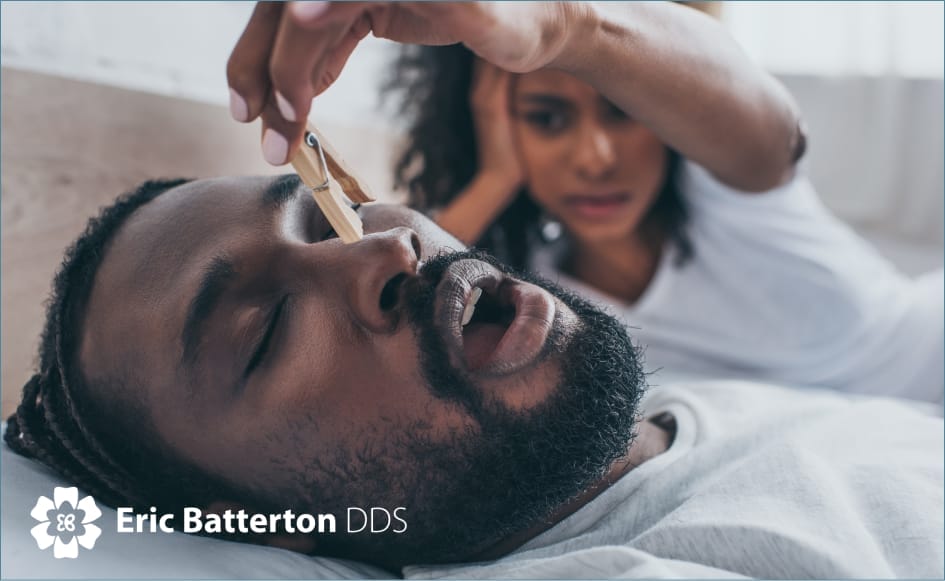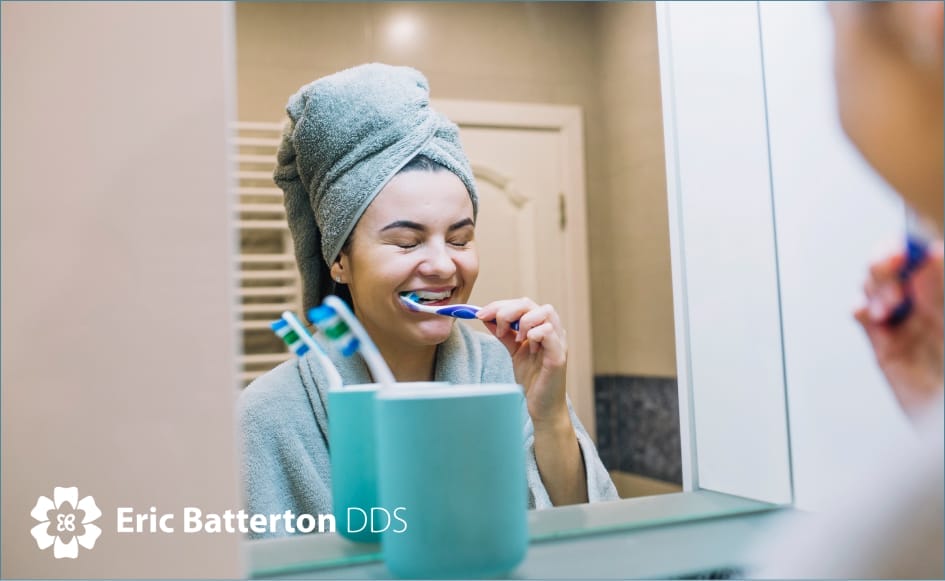Your nightly rest impacts more than just your energy levels—it plays a surprising role in your dental health. From jaw alignment to cavity prevention, there are surprising ways sleep affects your teeth, making quality rest an essential component of dental care.
Sleep Position, Jaw Alignment, and Drooling
Surely, you’ve heard that an incorrect sleeping position can have effects on your back. But did you know it can have effects on your teeth as well?
Back sleeping provides optimal jaw alignment, allowing your facial muscles to remain relaxed and preventing temporomandibular joint (TMJ) strain. This is good!
Conversely, side sleeping, particularly favoring one side, can create uneven pressure on your jaw joints and potentially lead to dental misalignment over time.
Drooling, while common during sleep, varies based on position. Side sleeping increases the likelihood of drooling, which reduces natural saliva protection for your teeth. While saliva typically helps neutralize harmful acids and bacteria, excessive drooling depletes this protective barrier, potentially increasing cavity risk. Back sleepers typically experience less drooling, maintaining better saliva distribution throughout the mouth.
For optimal dental health, dentists recommend:
- Back sleeping as the primary position
- If side sleeping is necessary, alternating sides regularly
- Slightly elevated head position (10-15 degrees) to reduce acid reflux
- Using an orthopedic pillow designed to maintain proper head and neck alignment
These adjustments help maintain proper jaw alignment, reduce grinding pressure, and optimize natural saliva distribution for better oral health during sleep.
Sleep Bruxism: The Silent Night Grinder
Sleep bruxism, the unconscious grinding and clenching of teeth during sleep, affects approximately 13% of adults. This nightly habit can wreak havoc on dental health, leading to worn tooth enamel, chipped teeth, increased sensitivity, and persistent jaw pain. The condition often manifests due to heightened stress levels, underlying sleep disorders like sleep apnea, dental misalignment, or as a side effect of certain medications and caffeine consumption.
The impact extends beyond dental damage. Many patients develop temporomandibular joint (TMJ) disorders, experiencing chronic headaches and facial muscle tension that can persist throughout the day.
The constant grinding also disrupts sleep quality, creating a cycle of poor rest and increased stress that may worsen the condition. Some individuals even report ear pain and tinnitus as secondary symptoms.
Fortunately, several treatment approaches exist. Custom-fitted night guards provide a protective barrier between upper and lower teeth, preventing further wear.
For severe cases, dental professionals may recommend addressing underlying bite issues or even consider targeted Botox injections to relax overactive jaw muscles. Stress management techniques and improved sleep hygiene often play crucial roles in reducing grinding frequency.
Most concerning is that many individuals remain unaware of their grinding habit until significant damage has occurred. Regular dental check-ups become essential for early detection, allowing intervention before permanent damage sets in. Dentists can spot early warning signs like unusual wear patterns and microfractures, making routine examinations a crucial preventive measure.

Sleep Apnea’s Dental Warning Signs
Dentists often serve as the first line of defense in identifying sleep apnea. During routine examinations, they look for telltale signs, such as an enlarged tongue, scalloped tongue edges, and a narrow palate—all indicators of restricted airflow. The size and position of the uvula, combined with enlarged tonsils, can signal potential airway obstruction during sleep.
Sleep apnea’s impact on dental health manifests through distinct patterns of wear on teeth. The condition often leads to bruxism as the body instinctively clenches and grinds teeth to maintain airway opening. This chronic grinding, combined with dry mouth from mouth breathing, accelerates tooth wear and increases cavity risk. The reduced oxygen levels associated with sleep apnea can also weaken gum tissue, making it more susceptible to inflammation and periodontal disease.
Mouth breathing, a common adaptation to restricted airways, creates a particularly harmful environment for oral health. When breathing through the mouth during sleep, saliva production decreases, leading to a dry mouth. This reduction in protective saliva allows harmful bacteria to thrive, increasing the risk of tooth decay and gum disease.
Dental professionals can offer specialized oral appliances as treatment options for mild to moderate sleep apnea. These devices, similar to mouthguards, work by holding the lower jaw slightly forward during sleep, maintaining an open airway. While CPAP remains the gold standard for severe cases, dental appliances offer a less intrusive alternative, with success rates reaching 54% in appropriate candidates. These custom-fitted devices require precise adjustment and regular monitoring to ensure effectiveness while preventing dental complications.

Nighttime Oral Care Routines
The timing of your nighttime brushing routine matters more than you might think. Dentists recommend brushing at least 30 minutes after your last food or drink, as this allows time for saliva to neutralize acids and begin the natural remineralization process. Brushing too soon after eating can actually spread acids around your teeth, potentially damaging enamel weakened by acidic foods.
Late-night snacking disrupts your mouth’s natural cleaning cycle. During sleep, saliva production decreases significantly, leaving teeth more vulnerable to acid attacks from bacteria. When you eat just before bed, food particles remain on your teeth throughout the night, giving bacteria an extended opportunity to produce decay-causing acids. This is particularly problematic with sugary or acidic snacks, which create an ideal environment for cavity formation.
Proper hydration plays a crucial role in preventing dry mouth during sleep. While staying hydrated throughout the day is important, sipping water right before bed can lead to disruptive bathroom trips. Instead, focus on consistent hydration earlier in the day and consider using a humidifier in your bedroom to maintain optimal moisture levels.
If you experience chronic dry mouth, discuss with your dentist about specialized rinses or oral moisturizers that can provide extended relief throughout the night. Remember to avoid alcohol-based mouthwashes before bed, as these can worsen dry mouth symptoms.
Sleep Quality and Oral Health Recovery
Deep sleep stages are crucial for dental tissue repair and regeneration. During these periods, the body increases the production of growth hormones that aid in repairing minor damage to tooth enamel, gum tissue, and bone structure. The enhanced blood flow during deep sleep also delivers essential nutrients to oral tissues, supporting their natural healing processes.
Research shows that individuals who consistently sleep less than six hours per night have significantly higher levels of periodontal inflammation. This inflammation risk increases in those experiencing chronic sleep deprivation, as inadequate rest impairs the body’s ability to regulate inflammatory responses. Poor sleep quality disrupts the balance of pro-inflammatory cytokines, leading to increased susceptibility to gum disease.
Sleep deprivation substantially weakens the immune system’s ability to fight oral infections. During proper sleep, the body produces and distributes immune cells that combat harmful bacteria in the mouth. Without adequate rest, these defense mechanisms become compromised, making individuals more susceptible to oral infections, canker sores, and delayed healing after dental procedures. Studies indicate that people sleeping less than seven hours nightly are three times more likely to develop oral infections compared to those getting eight hours of sleep.
Sweet Dreams, Healthy Teeth: Your Action Plan
The connection between sleep and dental health runs deeper than most realize. Quality sleep serves as a crucial foundation for optimal oral health, from tissue repair to immune system function.
By implementing proper sleep positioning, maintaining good nighttime oral care habits, and getting adequate rest, you can significantly enhance both your sleep quality and dental health. Your dentist and sleep habits are partners in maintaining that bright, healthy smile you deserve.
